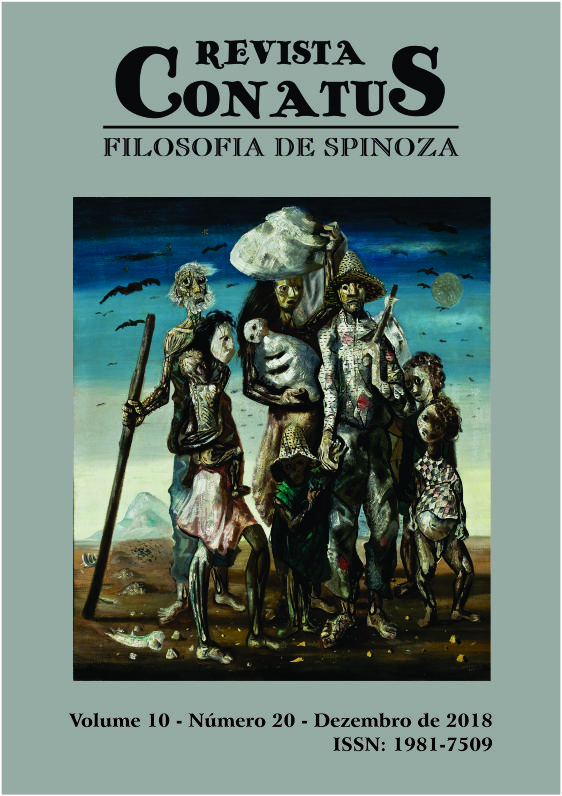Spinoza on human Teleology
Palavras-chave:
Teleology, Naturalism, Parallelism, Causal internalism/externalism, Activity, Goal, Inertial model, Essentialistic model, Teological model.Resumo
Diferentes comentadores acrescentam algumas razões contra a teleologia humana na filosofia de Spinoza; os outros aduzem razões em favor dessa teleologia. O problema é menos simples e eu gostaria de dar alguma contribuição para essa discussão. No meu artigo, apresento sistematicamente os principais argumentos contra a teleologia humana (naturalismo, paralelismo, internalismo causal e outros). Eles são todos bem fundamentados no spinozismo, mas no mesmo spinozismo também encontramos bons argumentos para a teleologia humana, e acho que os argumentos para a teleologia prevalecem. Embora Spinoza quisesse resolver esse problema desagradável levando em conta todo o seu sistema, isto é, de coerência de seu sistema, devemos permitir a teleologia humana a partir de uma simples razão: agindo teleologicamente, o homem pode alcançar objetivos mais elevados do que atuar inercialmente ou algo semelhante. Notamos o comportamento teleológico nas ações humanas, em primeiro lugar, quando realiza alguma ação complexa e importante. Se ele tem que realizar seu conatus perseverandi da melhor maneira que puder, ele pensará bem sobre possíveis estados futuros que suas ações conduzirão e ele pensará em meios disponíveis para alcançar o objetivo desejado. Se ele age (pelo menos às vezes, especialmente em ações importantes e complexas) de modo a levar em conta o estado desejado futuro, ele age teleologicamente e sua ação pode e deve ser explicada dessa maneira. O comportamento teleológico permite-lhe manifestar uma atuação superior ao desempenho de animais que obviamente não têm capacidade de pensar em possíveis resultados futuros mais diferentes. É claro que o homem pode atuar teleologicamente, mesmo em casos de busca de bens aparentes, o que Spinoza não recomenda, mas, mesmo nesses casos, ele é mais eficaz do que por meio da atuação inercial.
Abstract
Different commentators adduce some reasons against human teleology in Spinoza’s philosophy; the other adduce reasons in favor of that teleology. Problem is everything but simple and I would like to give some contribution to this discussion. In my article, I sistematically present main arguments against human teleology (naturalism, paralelism, causal internalism and other). They are all well founded in spinozism, but in the same spinozism we also find good arguments for human teleology, and I think the arguments for teleology prevail. Although Spinoza would like to resolve this unpleasant problem taking account of the whole of his system, that is, of coherence of his system, we must allow human teleology from simple reason: acting teleologically, man can achieve higher goals than acting inertially or something like that. Teleological behavior we notice in human actions first of all when he has to do some complex and important action. If he has to realize his conatus perseverandi in the best way he can, he will think well about possible future states his actions will lead to and he will think a lot of means available for achieving desired goal. If he acts (at least sometimes, especially in important and complex actions) in a way of taking account of future desired state, he acts teleologically and his action can and must be explained that way. Teleological behavior enables him to manifest acting superior to the acting of animals which obviously do not have capability of thinking about more different possible future outcomes. Of course, man can act teleologicaly even in cases of seeking for apparent goods, which is something Spinoza does not recommend, but even in that cases he is more efficacious than through inertial acting.










